My Cart
Hepatitis C Test
- Finger Prick Method
- Test for Hepatitis C
$37.00
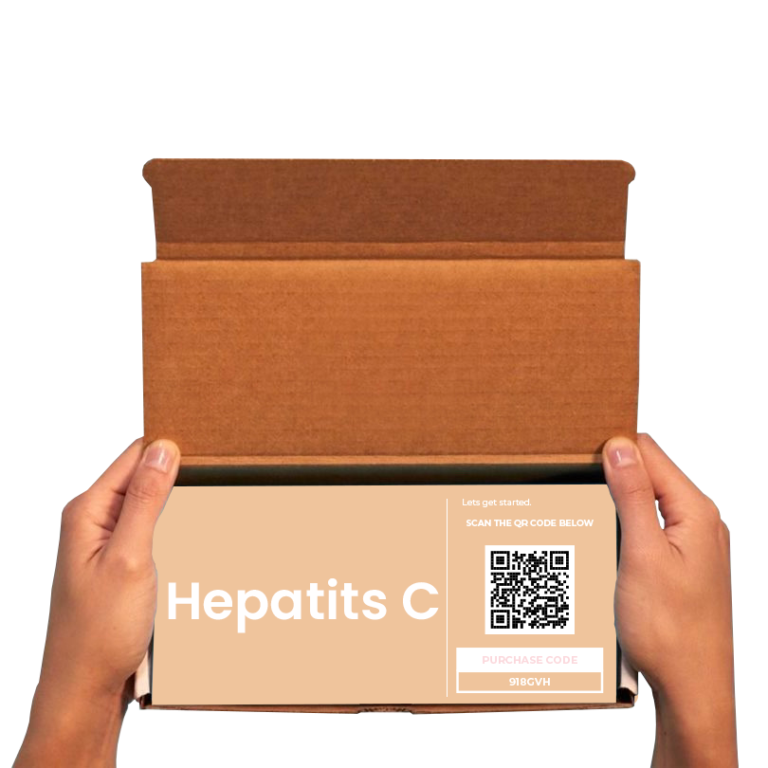
- 15 minutes
Home STD Test
Hepatitis C
- Finger Prick Method
- Test for Hepatitis C
$37.00
- Ships in 24 Hours
- Discreet Parcel
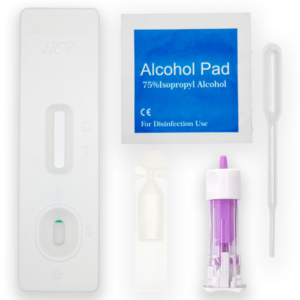
1 Minute instructions
Experiencing symptoms such as dark urine, loss of appetite, nausea, or abdominal pain?
Many people who are infected do not experience symptoms. If you are sexually active and want to know your status, this is a simple way to do your part in keeping yourself healthy and preventing the spread of STIs (or STDs).
Body
- Joint pain
- Fever
- Fatigue
Eyes
- Jaundice (Yellow skin or Eyes)
Groin
- Dark Urine
Stomach
- Loss of appetite
- Nausea
- Abdominal pain
This test is used to detect the presence or absence of the hepatitis C (HCV) antibody (Immunoglobulin G).
Your test results will tell you whether or not you have been infected with the hepatitis C virus (HCV). In the event that your test results are abnormal, you’ll have the opportunity to connect with our independent physician network at no additional cost to discuss your particular case.
Hepatitis C
Hepatitis C is a liver infection caused by the Hepatitis C virus (HCV), a blood-borne virus. HCV is more commonly transmitted through needles or blood exposure and only rarely spread through sexual intercourse. Approximately 75% of people with Hep C were born from 1945 to 1965.
Everything you need to understand your results
-
Detailed directions to guide you
-
Outreach on positive results
-
365 days live chat support
-
Help along the way if you need it
-
All materials for sample collection
-
Access to Labs across Malaysia
Experiencing symptoms such as dark urine, loss of appetite, nausea, or abdominal pain?
Many people who are infected do not experience symptoms. If you are sexually active and want to know your status, this is a simple way to do your part in keeping yourself healthy and preventing the spread of STIs (or STDs).
Body
- Joint pain
- Fever
- Fatigue
Eyes
- Jaundice (Yellow skin or Eyes)
Groin
- Dark Urine
Stomach
- Loss of appetite
- Nausea
- Abdominal pain
This test is used to detect the presence or absence of the hepatitis C (HCV) antibody (Immunoglobulin G).
Your test results will tell you whether or not you have been infected with the hepatitis C virus (HCV). In the event that your test results are abnormal, you’ll have the opportunity to connect with our independent physician network at no additional cost to discuss your particular case.
Hepatitis C
Hepatitis C is a liver infection caused by the Hepatitis C virus (HCV), a blood-borne virus. HCV is more commonly transmitted through needles or blood exposure and only rarely spread through sexual intercourse. Approximately 75% of people with Hep C were born from 1945 to 1965.Everything you need to understand your results
- Detailed directions to guide you
- Outreach on positive results
- 365 days live chat support
- Help along the way if you need it
- All materials for sample collection
- Access to Labs across Malaysia
Accurate Results
Our kits has an accuracy rate of 98% - 99%. We work only with the best manufacturer and health experts to ensure your tests results meet nationwide standards and are as accurate as tests done in a clinic or a doctor’s office.
Discreet Packing
Our packaging, Shipping Envelope and Airway Bill will NOT mention our domain name and product description. Each order is packed securely and sealed at the opening that rips upon opening to prevent resealing without receipient knowledge. VIEW SAMPLE
Secure Data
We are HIPAA compliant and takes your privacy very seriously. We use state-of-the-art, bank-grade encryption to ensure your data is stored securely, and under no circumstance do we ever sell your data. We do not provide data to insurance providers.
DIGITAL RESULTS
Results you can understand

Easy to understand
Gain meaningful insights about your health with easy-to-understand test results. We also provide you with additional resources and helpful tips along the way.
Personalized
View a personalized report of each STD tested as well as detailed information about what your results mean for you.
Actionable
Take action on your health and wellness. Use your report to help guide your next steps.
HOW IT WORKS
Test at home & get results instantly
Packing Your Order
Receive your Test Kit
Follow Our Step-By-Step Video
If Positive
If Negative
Risk Factors for Hepatitis C
You are at a greater risk of having the hepatitis C virus (HCV, also referred to as hep C) if you:
- Are a current or former injection drug user
- Received a blood transfusion or organ donation before 1992, or clotting factor replacement therapy before 1987 (clotting factor replacement is used to treat hemophilia)
- Are on dialysis for kidney failure
- Are HIV positive
- Have a mother with hepatitis C
- Have undergone body modification (like tattooing) without the use of sterile instruments
- Were born between 1945 and 1965
The Centers for Disease Control and Prevention (CDC) recommends that anyone born between 1945 and 1965 take a hepatitis C antibody test at least once. If you have never done testing for the hepatitis C virus, our at-home hep C test makes it easy to collect a small sample of blood (via a simple finger prick) from the convenience of home and send it to a lab for testing. Our HCV antibody test, sometimes called an anti-HCV test, checks if the infection is present in your body by looking for antibodies released by the immune system in response to the hepatitis C virus.
What is hepatitis C?
Hepatitis C is a bloodborne virus that is spread when blood from an infected individual enters the body of someone who is not infected. The HCV infection can cause both chronic and acute hepatitis in an individual. Acute hepatitis describes individuals who have only had the hepatitis C virus infection for 6 months or less, which is considered an acute infection. In chronic hepatitis cases, the infection is long-term. A chronic infection is a significant risk factor for liver disease and liver cancer, and is potentially life-threatening if left untreated.
If you think you may be at risk, taking our hep C test kit can help you check if you have this infection. Our HCV test is quick and easy to take (you collect a sample at home and send it to a lab for testing), and you can conveniently view your results on our secure, online platform.
How does hepatitis C spread?
The most common way to contract Hepatitis C is through needles (sharing needles for drug use or healthcare workers that have accidental sticks with Hepatitis C contaminated needles from infected patients). Pregnant women infected with Hepatitis C can spread the virus to their children at the time of birth. Less common ways to spread Hepatitis C include sexual contact, sharing personal care items like razors, and getting body modification procedures, such as tattoos and piercings, in non-sterile environments.
How to test for hep C
If you suspect you may have a hepatitis C infection, taking a hepatitis C test can be a great start in addition to consulting your healthcare provider for next steps. Our at-home hepatitis C test is a convenient way to check for this virus. To check for hepatitis C with this test, you just collect a small sample of blood with a simple finger prick, then ship the sample to a lab for testing with the prepaid shipping label that comes with the kit.
If your results from our hepatitis C test indicate that you do have this viral infection, share your results with your healthcare provider right away so you can take the next steps they recommend.
This hepatitis C screening test checks whether you test positive for hepatitis C.
In the event that your test results are positive and you notify us, an associate from our physician network will contact you directly to discuss your particular case as well as provide information on how to take the next steps to get treatment. We take customer privacy very seriously and will never share your information with a third-party.
As is the case with all STD testing – whether through EverlyWell or your doctor – we may be required by law to report positive test results to certain state health departments. This is only done to track infection prevalence. In rare cases you may not receive a definitive result because of early infection or inadequate sampling and repeat testing is suggested. Know where you stand with our at-home Hepatitis C test.
Should I wait 3 months to get tested? In short, No. We recommend getting tested as soon as you can, STD test kits has come a long way and they are more accurate than ever. You can test as early as 7 days. (Just enough time for our test to arrive at your doorstep). We recommend getting a test as soon as you can and another test in 3 – 6 months.
The accuracy of our test kit is around 98-99%.
Private clinics also uses rapid test kits as a preliminary test, similar to our STD / STI test kits.
Hepatitis C Symptoms
A hepatitis C virus infection often occurs without any immediate symptoms. In some cases, though, an infection can lead to symptoms that typically appear 2-12 weeks after exposure. These symptoms can include nausea, pain in the upper right part of the abdomen, dark urine, and jaundice (a yellow discoloration affecting the skin and whites of the eyes).
Chronic hepatitis C virus (HCV) infection can also trigger inflammation in the liver. Over time, this inflammation can contribute to severe liver damage-and result in chronic liver disease (including cirrhosis—scarring of the liver tissue), liver cancer, and liver failure.
In fact, long-term-or chronic-HCV infections are the main cause of chronic liver disease and liver cancer in the United States. (A chronic HCV infection refers to an infection lasting more than 6 months.) The damage hepatitis C causes the liver can be life-threatening, and it’s estimated that there are now more HCV-related deaths in the United States vs. deaths resulting from HIV.
Hepatitis C Diagnosis
Because HCV infections often come without symptoms, hepatitis C blood tests—which check for antibodies against HCV—are typically used to diagnose infections. Blood testing for hepatitis C can now be done from the convenience and privacy of your home with the our Hepatitis C Test.
If you test positive on an antibody-based test, confirmatory testing-or confirming a positive test result with another method-is usually the next step. Confirmatory testing is done with a nucleic acid test that detects HCV RNA. This type of test checks your body for genetic material-or “RNA”-that belongs to the hepatitis C virus.
If you test positive on both types of tests, it is recommended that you seek immediate medical treatment for both the infection and any liver damage that may have occurred.
Hepatitis C Treatment
Direct-acting antivirals (DAAs), taken orally, are the main form of treatment for active HCV infections. Treating an HCV infection as soon as possible is vital for your liver’s health. Not only does treatment reduce long-term complications, but is also highly effective in curing HCV infections (meaning no detectable HCV RNA on a nucleic acid test) and typical regimens only last 8-12 weeks. If you think you may have a hepatitis C infection, HCV testing (such as with our at-home hepatitis C screening option) is a good next step to take.
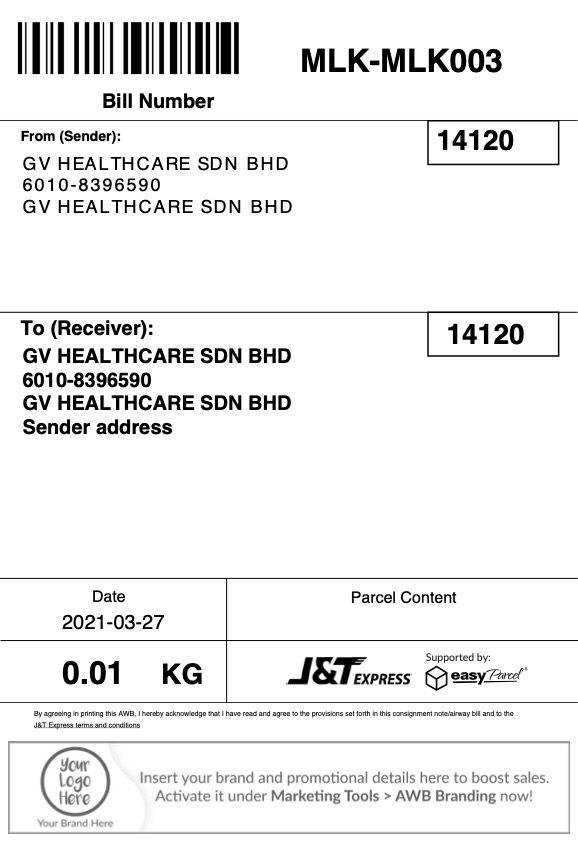
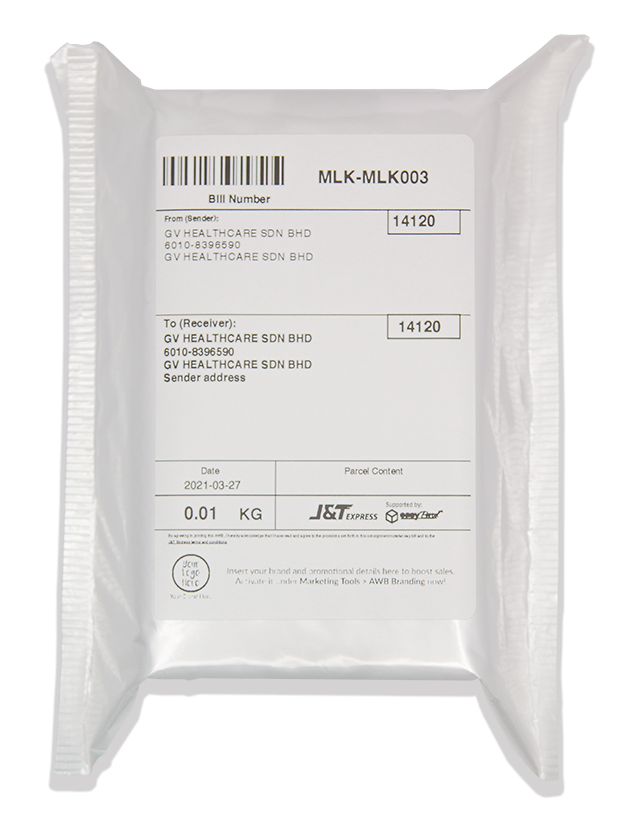



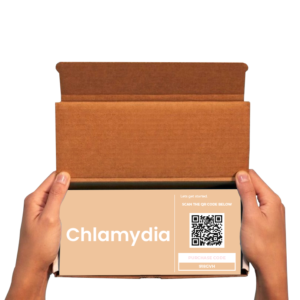
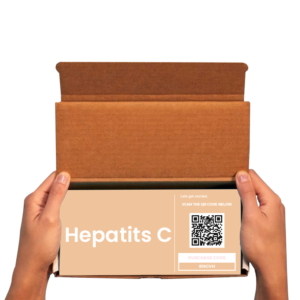
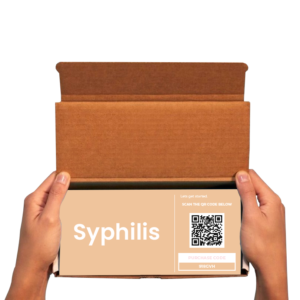


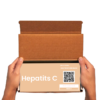
**Hidden Username**
Trusted seller ❤